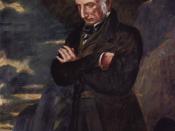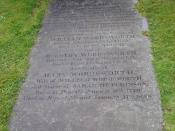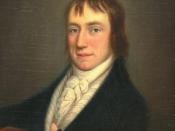The city is a place of sterility of chaotic attacks on people's very souls. In the 1790s as well as today the city was inhospitable to those of the population who needed freedom and natural life to thrive. William William Wordsworth was one of such people; living in a city took something from him. The city robed him of part of part of his will to live, a will he could only replenish trough the experience of nature and for a time the memories of such experiences.
William William Wordsworth was the most truly original genius of his age and exerted a power over poetic destiny of his century unequaled by any of his colleagues. William Wordsworth's love of Nature was reflected in his poems and he professed that happiness comes from noticing and enjoying the little things in life. From his earliest boyhood, he lived close with the beautiful objects of nature, but at the time, he did not realize that his character had been built up by these influences.
In 1782, England acknowledged the independence of the United States. In 1789, William William Wordsworth journeyed through Derby Shire with his sister, Dorothy, and their relative, Mary Hutchinson, who afterwards became his wife; and in 1790, he went with his friend, Robert Jones, for a walking tour through France and Switzerland. It was then that the poet first encountered the French revolutionary movement. Also in 1789 came the Storming of the Bastille. To him the demands of the French revolutionists seemed not extraordinary, but merely just; he entered into them with enthusiasm.
However, as all things fade, the honorable French Revolution took a turn down a dark path on January 21, 1793, the French Convention sent Louis XVI to the scaffold, and a week later war was declared...


